Past Events
“Morocco, More Than Just a Partner to Belgium and the EU”
Lunch Conference with H.E. Mr. Addahre, Moroccan Ambassador to Belgium and H.E. Mr. Alem, Moroccan Ambassador to the EU
Brussels – 26 March 2013
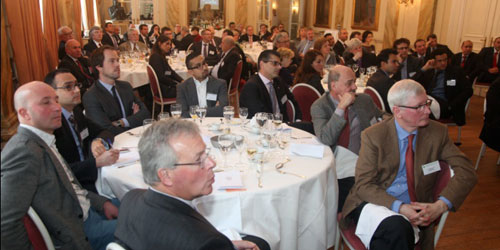
Over the last two years, not a day has gone by in which the Arab world has not received extensive media coverage. Among these reports, news about Morocco seemed relatively absent. But in the meanwhile, “Morocco is moving forward, Morocco is restructuring, Morocco is developing”. These are the words with which Mr. Hijazin, Secretary General of the ABLCC opened the lunch conference entitled “Morocco, More than just a Partner to Belgium and the EU”, which was held on the 26th of March in the presence of H.E. Mr. Addahre, Moroccan Ambassador to Belgium, H.E. Mr. Alem, Moroccan Ambassador to the EU and many Belgium and Luxembourgish companies with an interest in the booming Moroccan market.
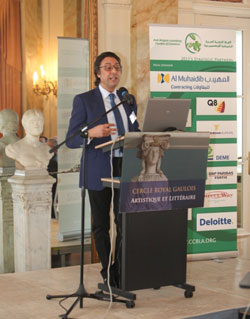 The floor was then given to Mr. Addahre, who gave an overview of the most important economic developments in the country. As was pointed out by the Ambassador, Morocco is able to build on strong macro-economic fundamentals, as it is enjoying steady GDP growth (estimates for 2013 hover around 4%), a stabilized inflation that lives up to EU standards at 2,2%, relatively low unemployment, high FDI rates and a stable currency based on a euro-dollar basket. The implementation of a clear economic program that exploits these assets is the responsibility of the Moroccan Investment Development Agency (AMDI) and the Regional Investment Centers (CRI). They focus on the development of program-contracts between the government and a plethora of sectors, the promotion of SME’s and the creation of FDI opportunities through fiscal incentives, investment conventions and the easing of custom procedures.
The floor was then given to Mr. Addahre, who gave an overview of the most important economic developments in the country. As was pointed out by the Ambassador, Morocco is able to build on strong macro-economic fundamentals, as it is enjoying steady GDP growth (estimates for 2013 hover around 4%), a stabilized inflation that lives up to EU standards at 2,2%, relatively low unemployment, high FDI rates and a stable currency based on a euro-dollar basket. The implementation of a clear economic program that exploits these assets is the responsibility of the Moroccan Investment Development Agency (AMDI) and the Regional Investment Centers (CRI). They focus on the development of program-contracts between the government and a plethora of sectors, the promotion of SME’s and the creation of FDI opportunities through fiscal incentives, investment conventions and the easing of custom procedures.
Another important topic on the Moroccan agenda is infrastructural development, covering the extension of the railway network (to the Tanger-Med port and Nador in the north and Agadir in the south, construction of a high speed connection between Tanger and Marrakech), the highway network and port infrastructure. With Tanger Med, Morocco is hosting the biggest port on the African continent. The rehabilitation of new industrial parks with a focus on the private sector, the creation of technopoles (Casanearshore, Rabat Technopolis, Fez Shore, Tanger Shore) and the development of touristic infrastructure through “Plan Azur” also form part of Morocco’s ambitions in this regard.
The Ambassador then passed on to the country’s growth sectors, starting with the off shoring industry. A remarkable phenomenon consists in the exponential growth of offshore call centers, as Morocco attracts foreign investors from the sector due to the presence of a state of the art telecommunication infrastructure, competitive human resources with strong language skills and a well developed network of IT companies. At present, nearly 180 units are working to service French, Spanish and even Dutch clients. Boasting well adapted automobile assembly sites, Morocco is also increasingly becoming an attractive location for the assembly of vehicles and the delivery of automotive equipment to the European market. But also the aerospace industry has found its way to the kingdom, as over sixty companies from the sector are enjoying free zone benefits and governments support of up to 10% of investments. Moving on to the agribusiness, Mr. Addahre pointed out the existence of a program envisaging the transfer of 56000 hectares of state owned farmland to investment projects to develop the principal food chains. A final key sector that was mentioned by the Ambassador is the leather and textile industry. Here, important investment projects mentioned are those recently realized by Legler, Settavex and Fruit of the Loom. Looking to the future, Morocco furthermore aims to expand this list of successful industries by heavily investing in the (electro) mechanical and metallurgic sectors.
Finally touching upon Moroccan-Belgian trade, Mr. Addahre was proud to point out that Belgian –Moroccan commercial exchanges are continuously improving. According to the Belgian Foreign Trade Agency, export to Morocco in 2012 has increased by 16.1% compared to 2011, reaching over 825 million euro, while Moroccan imports in Belgium, which amount to 637 million euro, grew by a spectacular 40% over the same period. In the first group, most important sectors include equipment, chemical products, plastic materials, copper, solar energy equipments, fertilizers, pharmaceutical products, engineering services and expertise and hydraulics. Moroccan imports in Belgium consist mainly of phosphates, phosphoric acids, electric cables, food, textile and leather and pharmaceutical products.
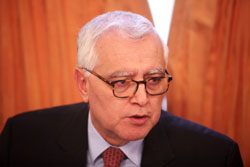 Not only Belgian-Moroccan relations are thriving, the country is also reinforcing its partnership with the EU. At a time when EU and Morocco are closer than ever, it is a great advantage to be able to receive first hand information on the topic from the Moroccan Ambassador to the EU. During his presentation, Mr. Alem extensively discussed the Eu-Morocco relationship, which emphasizes close cooperation on democratic reform, economic modernization, and migration issues. Today, the EU is Morocco’s first trading partner, textiles and agricultural goods being the most important export products. From the Moroccan side, agricultural products equally occupy an important place in exports to the EU, next to clothing and machinery and transport equipment. In terms of services, EU exports to Morocco consist mainly of communications and business services and transportation, while it mainly imports travel services, transportation and communications services from Morocco.
Not only Belgian-Moroccan relations are thriving, the country is also reinforcing its partnership with the EU. At a time when EU and Morocco are closer than ever, it is a great advantage to be able to receive first hand information on the topic from the Moroccan Ambassador to the EU. During his presentation, Mr. Alem extensively discussed the Eu-Morocco relationship, which emphasizes close cooperation on democratic reform, economic modernization, and migration issues. Today, the EU is Morocco’s first trading partner, textiles and agricultural goods being the most important export products. From the Moroccan side, agricultural products equally occupy an important place in exports to the EU, next to clothing and machinery and transport equipment. In terms of services, EU exports to Morocco consist mainly of communications and business services and transportation, while it mainly imports travel services, transportation and communications services from Morocco.
As was pointed out by Mr. Alem, EU-Morocco trade relations are currently governed by the Association Agreement which entered into force 1st March 2000, and provides for the creation of a Free Trade Area. In addition, an EU-Morocco Agreement on Agricultural, Processed Agricultural and Fisheries Products entered into force 1st October 2012. A protocol on Dispute Settlement equally has been signed and ratified.
Negotiations for a Deep and Comprehensive Free Trade Area between the EU and Morocco are currently being launched. Its most important objective is to bring Moroccan legislation closer to that of the EU in trade-related areas. More particularly, it is intended to significantly extend the scope of the existing Association Agreement to include trade in services, government procurement, competition, intellectual property rights, investment protection and the gradual integration of the Moroccan economy into the EU single market. The latter aspect applies in particular to industrial standards and technical regulations or sanitary and phytosanitary measures.
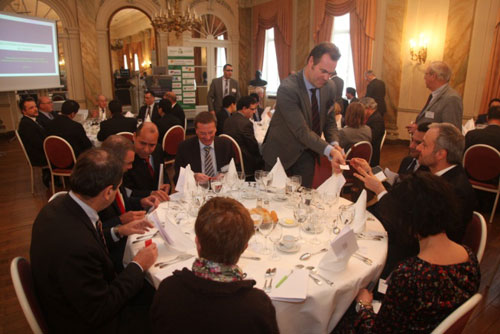
After the informative presentations, participants were invited to exchange thoughts and liaise with colleagues and potential business partners over lunch.
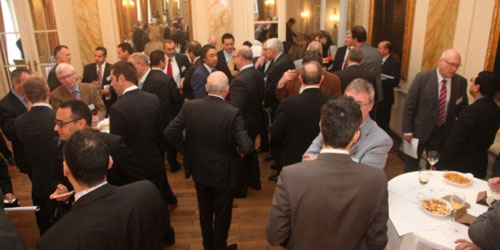
Are you ready to explore your opportunities in Morocco? An overview of information on laws, procedures and benefits related to investing in Morocco can be consulted in an investor guide available at www.invest.gov.ma.
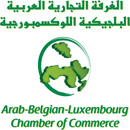 |
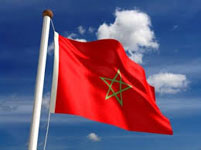 |
